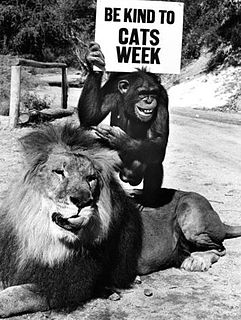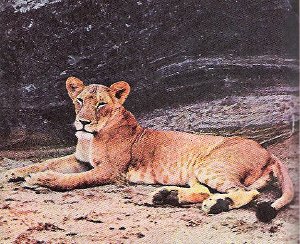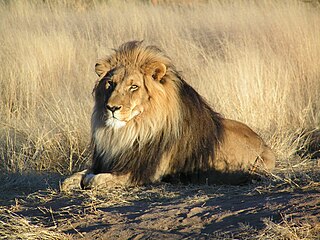 W
WCecil was a lion who lived primarily in the Hwange National Park in Matabeleland North, Zimbabwe. He was being studied and tracked by a research team of the University of Oxford as part of a long-term study.
 W
WDaktari is an American family drama series that aired on CBS between 1966 and 1969. The series is an Ivan Tors Films Production in association with MGM Television starring Marshall Thompson as Dr. Marsh Tracy, a veterinarian at the fictional Wameru Study Center for Animal Behavior in East Africa.
 W
WElsa the lioness was a female lion raised along with her sisters "Big One" and "Lustica" by game warden George Adamson and his wife Joy Adamson after they were orphaned at only a few days old. Though her two sisters eventually went to the Netherlands' Rotterdam Zoo, Elsa was trained by the Adamsons to survive on her own, and was eventually released into the wild.
 W
WGilmore (1930–1950) was a lion who flew with aviator Colonel Roscoe Turner to promote the Gilmore Oil Company. After he grew too large for flying, Gilmore accompanied Turner in publicity appearances for the next ten years.
 W
WThe lion is a species in the family Felidae and a member of the genus Panthera. It has a muscular, deep-chested body, short, rounded head, round ears, and a hairy tuft at the end of its tail. It is sexually dimorphic; adult male lions have a prominent mane. With a typical head-to-body length of 184–208 cm (72–82 in) they are larger than females at 160–184 cm (63–72 in). It is a social species, forming groups called prides. A lion pride consists of a few adult males, related females and cubs. Groups of female lions usually hunt together, preying mostly on large ungulates. The lion is an apex and keystone predator; although some lions scavenge when opportunities occur and have been known to hunt humans, the species typically does not.
 W
WLiuwa Plain National Park is an 3,369-square-kilometre (1,301 sq mi) national park in Zambia's Western Province. "Liuwa" means "plain" in the local Lozi language, and the plains originally served as a hunting ground for Lubosi Lewanika, the Litunga of the Lozi people. The area was designated as a protected area by Lubosi Lewanika in the early 1880s, and as a national park in 1972, when Zambia's government took over management. The nonprofit conservation organization African Parks has managed Liuwa in partnership with the Department of National Parks and Wildlife and the Barotse Royal Establishment since 2003.
 W
WThe Lion of Gripsholm Castle is a notable example of bad taxidermy, in the museum of Gripsholm Castle, in Sweden. The lion is badly stuffed and has a comically unrealistic face.
 W
WMara the Lioness is an animal actor who appeared as Elsa in the 1966 movie Born Free, based on the true story of Elsa the Lioness raised by George and Joy Adamson.
 W
WThe Mfuwe man-eating lion was one of the largest man-eating lions on record, perhaps the largest, at over 10 feet (3.0 m) in length and 500 pounds (230 kg) in mass. It was killed in 1991 in the Luangwa River valley, Zambia, by an individual from California. It had eaten six humans around Mfuwe, the valley's main settlement. The cat's body has been on display at the Field Museum in Chicago since 1998, its specimen joining a notorious pair of man-eating lions dubbed the Tsavo lions.
 W
WSupercub was a male lion that was adopted as a cub from the Nairobi National Park Orphanage near Nairobi, Kenya. In 1972, Supercub was a pride member with Christian the lion and other lions being cared for by conservationist George Adamson in the Kora National Reserve in Kenya. The lion, whose personality was described as "boisterous" and "extroverted", was dubbed Supercub by Adamson.
 W
WThe Tsavo Man-Eaters were a pair of man-eating male lions in the Tsavo region, which were responsible for the deaths of a number of construction workers on the Kenya-Uganda Railway between March and December 1898. The significance of this lion pair was their unusual behavior of killing men and the manner of their attacks.
 W
WCecil was a lion who lived primarily in the Hwange National Park in Matabeleland North, Zimbabwe. He was being studied and tracked by a research team of the University of Oxford as part of a long-term study.